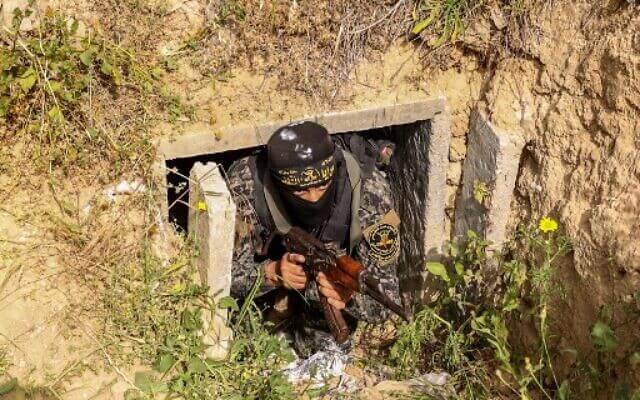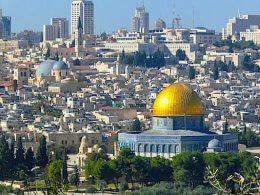In a “tunnel city” under the sandy soils of southern Gaza, Palestinian terrorists are preparing for the next conflict with Israel, as tensions in Jerusalem threaten to escalate.
The underground passageways leave no trace on the surface.
But in a wooded area near Khan Younis, seven masked men in military fatigues carried a collection of machine guns and grenade launchers into a tunnel entrance discreetly tucked into the foot of a small hill.
The gunmen wear headbands of the Al-Quds Brigade, the armed branch of the Islamic Jihad terror group which is the second-largest armed faction in Gaza, after Hamas, which rules the territory.
The tree branches covering the hole reveal a narrow passageway walled and topped with concrete blocks.
Complete with electric lights, a ventilation system and telecoms cables, the tunnels also have small rooms for storing weapons and ammunition.
An Islamic Jihad official told AFP during a media tour that the movement has both defensive and offensive tunnel systems.
The latter “is used for taking Israeli soldiers captive, repelling Israeli ground offensives and carrying out various field operations,” said the commander.
As he was talking, he received a radio alert of a “security incident” east of Gaza City — a false alarm.
Last May during an 11-day war initiated by Gaza’s Hamas rulers, Israel launched multiple strikes against what it called the “Gaza Metro,” a network of tunnels that had allowed gunmen to move around without being spotted by Israeli drones and to take Israeli targets by surprise.
Residents of Gaza, a cramped, besieged coastal territory home to 2.3 million people, have had a long experience of using tunnels since 2007, when Israel and Egypt imposed a crippling blockade in response to Hamas seizing power in the Strip. Israel maintains the blockade to prevent Hamas, which openly seeks to destroy Israel, and other Gaza terror groups from importing weapons.
Smugglers established a network of tunnels on the border with Egypt, enabling them to import everything from desperately needed household goods to cars and even Kentucky Fried Chicken — as well as weapons.
In recent years, Egypt has destroyed most of those tunnels.
Israel, for its part, has boosted its forces around the territory, reinforcing a hyper-secure barrier with an underground steel wall it hopes will prevent tunnels from reaching into Israeli territory.
Israeli commanders fear terrorists could use such tunnels to seize Israeli personnel or civilians for use as bargaining chips in prisoner exchanges.
But even if Islamic Jihad’s tunnels cannot reach Egypt or Israel, they are still “a strategic weapon for the resistance,” said Al-Quds Brigade spokesman Abu Hamza.
“We will let the days and the battles to come do the talking about the ability of the resistance to break through this so-called [Israeli] barrier,” he told AFP.
Weeks of deadly violence including a series of Palestinian terror attacks in Israel, Palestinian riots and a police crackdown around Jerusalem’s Temple Mount/Al-Aqsa Mosque, and stepped up IDF operations in the West Bank have prompted Islamic Jihad to threaten an escalation.









